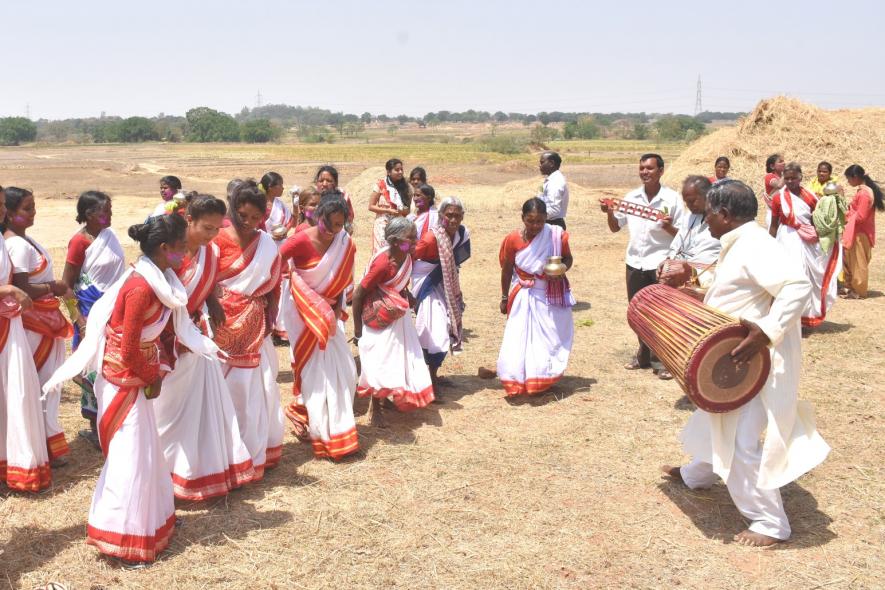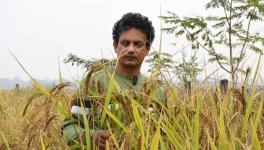Tribal Outfits Gearing up to Restart Stir on Sarna Religious Code Issue

Sarna People in Ranchi (Jharkhand) in their traditional attire. Image Courtesy: Wikimedia Commons
Kolkata: Several Scheduled tribe (ST) organisations are planning to embark on renewed phase of agitations on September 20 concerning their long-pending demand for recognition of the Sarna religion. The organisations demand that it be assigned as a separate religious code in the Census 2021.
The agitations will also highlight other grievances that await redressal despite provisions legislated or administratively okayed. Before firming up plans for the upcoming round of agitations, one ST empowerment outfit wrote to President Droupadi Murmu, a person of tribal origin, urging her to use her good offices to meet their demands and redress their grievances.
A significant point that emerges is that the President is constitutionally empowered to take steps, through state governors, for the protection and welfare of STs. But, powers-that-be seldom utilise these provisions.
The demand for a separate religious code and recognition for Sarna got political support on November 11, 2020, when the Jharkhand Assembly passed a resolution backing the demand and asking the Centre to take appropriate steps.
In recent weeks, the demand received further political support as West Bengal's chief minister Mamata Banerjee has seen merit in it and has promised follow-up action, including legislative approval. Chief minister Hemant Soren's compulsions stem from Jharkhand's largest concentration of tribals – 26% plus of the country's tribal population of 10.5 crore as per the 2011 census.
The urgency for Banerjee to reach out to a reasonably sizeable tribal population can be attributed to panchayat elections which will be due in a matter of months, and the fact that the Bharatiya Janata Party (BJP) has been able to make inroads in West Bengal's tribal belt in the last few years. The victory by a considerable margin of Murmu in the presidential election will naturally be a strong campaign point for BJP, which projected her as a tribal icon.
The agitation programme drawn up by the organisers includes 'rail roko' in tribal areas of West Bengal and Odisha and demonstrations in Bhubaneswar on September 20 and Kolkata on September 30.
Chief advisor of Adivasi Kudmi Samaj, Ajit Prasad Mahato, who is handling the programme in the state, told NewsClick that going by the painful experience in the past, this time round, the organisation would not entertain any official offer for talks for the first three days and subsequently, if at all, the organisers would be open for talks only with the "appropriate authority."
Chairman of Adivasi Sengel Abhiyan (Adivasi empowerment campaign) Salkhan Murmu, a former BJP Lok Sabha member from Mayurbhanj In Odisha, told NewsClick their emphasis this time round is on large-scale mobilisation in Bhubaneswar and Kolkata. As in 2021, they had organised 'rail roko'; they feel there is no need for this format of agitation at this juncture. They staged a demonstration and held a mass prayer at New Delhi's Jantar Mantar on Thursday, June 30, 2022, to mark the anniversary of the beginning of the Santhal rebellion against the British on June 30, 1855.
The tribal outfits would resume their campaign for the Sarna religious code and strict implementation of schedule V provisions in November by meeting a host of dignitaries in New Delhi, according to Bandhan Tigga, revered as a Sarna 'dharamguru' and has his ashram at Murma.
Acknowledged by tribals as one of the pioneers of the Sarna movement, Tigga told NewsClick that the plan is to organise a big demonstration at Jantar Mantar in New Delhi on November 11 and seek appointments with President, Prime Minister, home minister and Delhi chief minister.
Explaining what the Sarna religion is, the sources NewsClick spoke to pointed out that people believing in 'Jal, Jangal and Zameen' and having faith in nature worship are followers of this religion. They worship trees and hills and go all out to protect forests.
Sengel Abhiyan leader Salkhan Murmu emphasised that Adivasis are neither Hindus nor Christians. They have their way of life, religious practices, customs and culture.
Tigga highlighted that their rites related to birth, marriage and death differ from those observed by the Hindus. For example, he says, "We regard birth as arrival upon the earth and offer our thanks by holding a special bhumi puja. For marriage, guardians from the boy's side visit the girl's place for negotiations, and there is no practice of dowry and 'tilak'."
According to the President of Ranchi-based Akhil Bharatiya Adivasi Vikas Parishad and an activist with Kendriya Sarna Samiti (KSS), Satyanarayan Lakda, "Our main job is to work for the welfare of tribals who have remained neglected a lot for ages and enlighten them on how they can retain their distinctive identity."
KSS activist Hindu Bhagat who has a base in Gumla, which has the highest concentration of tribals in Jharkhand, said the organisation's task is cut out.
"Prevent efforts to dilute our distinctive identity and culture by vested interests, who regularly seek opportunities to lure them to their side with inducements and brainwashing". The roles of Hindutva elements and Christian missionaries in tribal areas of the country have remained the cause of tensions and animated debates for a long time.
President of Central Sarna Samiti of Jharkhand Fulchand Tirkey sounded optimistic about their long-drawn struggle ultimately succeeding.
As for christening the religious code as Sarna, a contrarian view was expressed by Kripasindhu Mahata of Totemic Kudumi/Kurumi Mahata Samaj. Based at Baripada in the Mayurbhanj district, Mahata argued in favour of a generic nomenclature that is easily remembered, referred to and recalled, and all-inclusive.
"The religious code should ideally be 'adivasi', and it would refer to the entire tribal population in the country and even those who have migrated and settled elsewhere," Mahata told NewsClick. Some sections of tribals call their religion Sari, not Sarna.
Salkhan Murmu wrote a letter to the President on August 10 pointing out several instances of safeguards and empowerment provided in Article 244 under schedule V remaining as pious intentions. He has also demanded ST status for tribals of Jharkhand origin residing in Andaman & Nicobar Islands and several areas in Assam for generations.
As for the tardy implementation of Constitutional provisions, the following extracted portion from an article in The Economic Times of August 6, 2022, written by former chairman of National Commission for Scheduled Tribes Raghav Chandra (IAS: 1982: MP), provides glaring examples.
Chandra writes, "... there are several macro areas where the President's personal review can help make a difference to a lot of scheduled tribes. One, for instance, even though the Panchayats (Extension to Scheduled Areas) Act (PESA)for ensuring self-governance through the traditional institution of the gram sabha for people living in the scheduled areas was enacted in 1996, its implementation by the states has been sketchy and piecemeal. Despite enabling provisions under PESA, states do not yet uniformly empower tribal gram sabhas to take various decisions relating to, for example, collection/extraction of minor forest produce ... and minor minerals and the right to market them and use the sale proceeds. Two, the implementation of the Forest Rights Act 2006 (FRA), which valiantly attempted to undo the historical dispossession of scheduled tribes from the forests, has not been liberally interpreted and forcefully implemented."
Although FRA mandates acceptance of the recommendations of the gram sabha, Chandra has observed most meetings of forest rights committees have been held at the gram panchayat level, where awareness and sensitivity about specific tribal rights are relatively less.
For the record: In a letter dated April 4, 2013, addressed to then Jharkhand Governor Shekhar Dutt and other Governors in schedule V areas, the then Union minister for tribal affairs and Panchayati Raj V Kishore Chandra Deo wrote, "It has been held by the courts of law that the Governors have full powers to make regulations which are laws and just as Parliament enact ... a piece of legislation which applies to a particular State, similarly under Clause 5 of schedule V, Governor can apply specific laws to the scheduled area. Upholding the Governor's power under schedule V, the Attorney General had also opined that in performance of the functions and exercise of powers under schedule V, the Governor is not bound by the aid and advice of the Council of Ministers of the State. As may be seen, basically in terms of the provisions of Article 244 read with schedule V to the Constitution, the Governors have broadly speaking the following powers ; (1) Legislative (2) Executive." [Deo's letter is one of the enclosures forwarded to the President by Salkhan Murmu with his letter of August 10].
Meanwhile, with the Union cabinet approving a Constitution amendment on September 14 for the inclusion of 15 groups of tribals in Himachal, Chhattisgarh, Karnataka, Tamil Nadu and Uttar Pradesh in the ST category, the total number of tribes to be notified under Article 342 of the Constitution will increase, when the amendment is through, to 720 from 705 as of now.
Get the latest reports & analysis with people's perspective on Protests, movements & deep analytical videos, discussions of the current affairs in your Telegram app. Subscribe to NewsClick's Telegram channel & get Real-Time updates on stories, as they get published on our website.
























